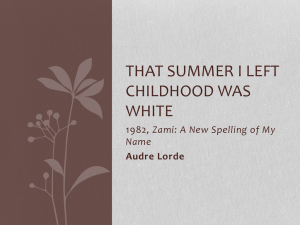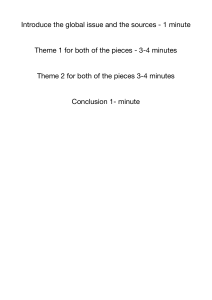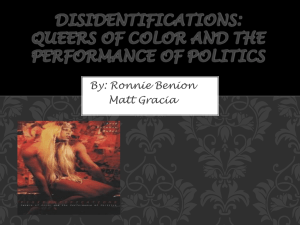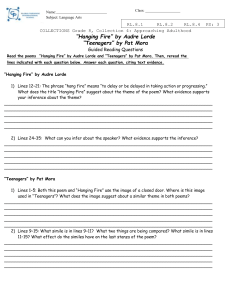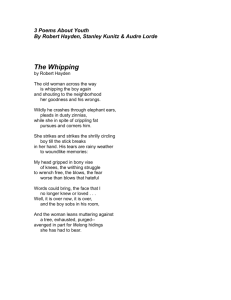Exploring Theme: Denotation, Connotation & Thematic Statements
advertisement
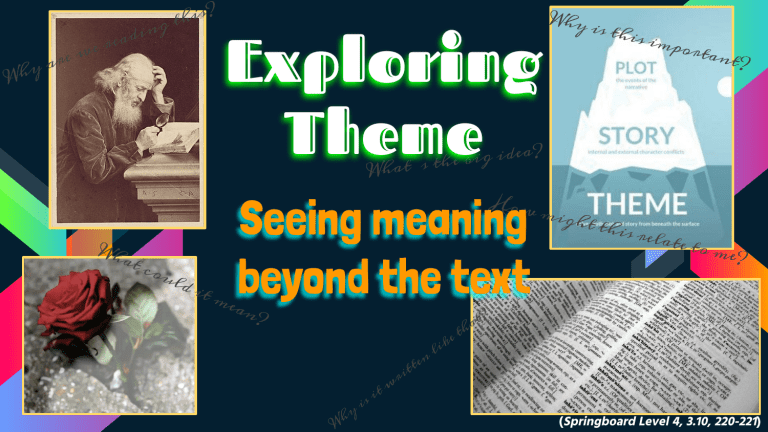
ya Wh e re w hi gt din rea s? Exploring Theme the big What’s at co ul d it Seeing meaning beyond the text me an ? hy W tw i is en tt ri ke li t s im port ant? idea? How Wh Why is th i mig ht th is re late t o me ? ? t ha (Springboard Level 4, 3.10, 220-221) Connotation and Denotation Words can have many meanings - even in a dictionary, you’ll find that words you may already know have additional definitions! Denotation is the literal or primary definition or meaning of a word or phrase. Connotation is the idea or feeling that a word invokes in addition to its literal or primary definition. Some meanings, though, you won’t find in a dictionary. More than just slang, innuendo, and jargon, connotative meaning - or connotation gives meaning beyond a literal understanding of what is written or said. What it’s all about A topic or subject is the matter or issue that is dealt with or addressed in a text or dialogue. Topics and themes are different from one another. For example, possible topics for The Scarlet Letter might include “sin” and “peer judgement,” but these are only part of what is considered a theme. A theme must include general ideas about the topic as it relates to reality - not specific to the text. So, themes of The Scarlet Letter might be, “sin can create a heavy burden,” or “peers are often harsh judges of one’s character.” › A theme is what a writer could be trying to say about a topic. Theme is an author’s central idea or main message about life. Explicit themes are clearly stated by the author within a text, while implied themes are understood through the writer’s diction, language construction, and use of literary devices. What’s a theme? NOT A THEME › A command or definition › It doesn’t tell us how to behave by using words like “should,” and it does not simply define a word. › A common saying, cliche, or moral › It isn’t a cliche like “actions speak louder than words” or a moral like “slow and steady wins the race.” › Specific to the text › It does not refer to the specific characters or places in the text. › Absolute › Does not use absolute language like “all,” “none,” “everything,” or “always,” because these statements are rarely true and are usually impossible to prove. THEME › An observation › It makes a comment about the way things appear to be in reality. › Original and thoughtful › It should be something you find interesting, philosophical, and whose wording you have come up with yourself. › General, about reality › It translates characters and plots into generalizations, such as “people,” “parents,” or “raising a child.” › Reasonable › It uses terms like “sometimes” or “often,” or refers to limited circumstances, to suggest a more realistic view of life. What’s a theme? THEME How do you write a THEMATIC STATEMENT? It’s pretty easy! ● Start with a TOPIC: HAPPINESS FAITH ● What could the author be trying to say about it? It makes a comment about the way things appear to be in reality. “People will often defend their faith “Personal growth and satisfaction can when challenged.“ be instrumental to a person’s happiness.“ It should be something you find interesting, philosophical, and whose wording you have come up with yourself. “People often reveal their character “Abased person’s true nature is often on where they place their reflected by what brings them faith.” happiness.” It translates characters and plots into generalizations, such as “people,” “parents,” or “raising a child.” “Faith can help people to become “Happiness can bring people closer.” together.” › An observation › › Original and thoughtful › › General, about reality › › Reasonable › It uses terms like “sometimes” or “often,” or refers to limited circumstances, to suggest a more realistic view of life. “Faith can help sustain a person in the “Happiness comes from most tryingsometimes times.” the most unexpected places.” Poet: Audre Lorde Audre Lorde (1934-1992) attended Hunter College and Columbia University and was a librarian in New York before publishing her first volume of poetry. She went on to become a leading African-American poet and essayist who gave voice to issues of race, gender and sexuality. Her second volume of poetry entitled Cables to Rage (1970), which took on themes of love, deceit and family, and which also addressed her own sexuality in the poem, "Martha." She would later teach at John Jay College and Hunter College in New York. “Audre Lorde.” Biography.com, A&E Networks Television, 16 Apr. 2019 York In From a Land Where Other People Live (1973), she explored issues of identity and global issues. New Head Shop and Museum (1975) was even more overtly political. In The Black Unicorn (1978), considered one of her greatest works, Lorde explored her African heritage. Throughout her poetry and other writings, she tackled topics important to her as a woman of color, a lesbian, a mother and a feminist. In terms of her nonfiction work, she is best remembered for The Cancer Journals (1980), in which she documents her struggle with breast cancer. Lorde refused to be victimized; instead, she considered herself and women like her to be warriors. Audre Lorde battled cancer for more than a decade, and in her last years, she took an African name, Gamba Adisa, meaning "she who makes her meaning clear." Lorde, Audre. Sister Outsider: Essays and Speeches. Crossing Press, 2007. “Hanging Fire” I am fourteen and my skin has betrayed me the boy I cannot live without still sucks his thumb in secret how come my knees are always so ashy what if I die before the morning comes and momma’s in the bedroom with the door closed. I have to learn how to dance in time for the next party my room is too small for me suppose I die before graduation they will sing sad melodies but finally tell the truth about me There is nothing I want to do and too much that has to be done and momma’s in the bedroom with the door closed. Nobody ever stops to think about my side of it I should have been on Math Team my marks were better than his why do I have to be the one wearing braces I have nothing to wear tomorrow will I live long enough to grow up and momma’s in the bedroom with the door closed. - Audre Lorde (1997) Write a thematic statement: ● THINK: What is “Hanging Fire” about? (topics) ● STATE: What is Audre Lorde trying to say about _____________________? Audio
